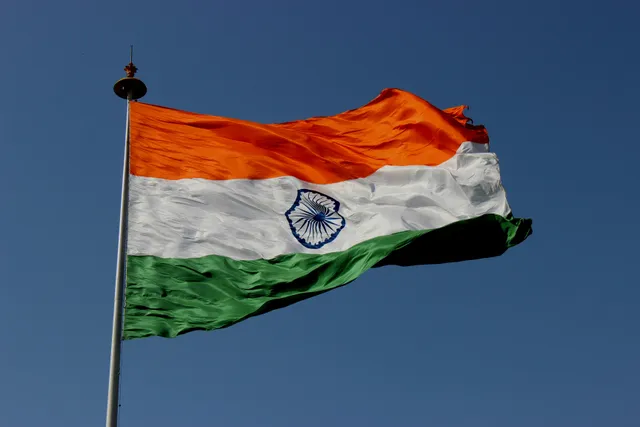- By Dr Sadhana Kala
- Tue, 16 Sep 2025 02:24 PM (IST)
- Source:JNM
September 15, the International Day of Democracy, is a public holiday in several countries. However, for India, it should serve as a day of awakening. We are proud to be the largest democracy in the world, but too often we act like democracy is someone else's job—something that politicians govern, and judges protect. The truth is harsher: democracy only works when people stand up for it, and too frequently, we don't.
The Constitution's Bravery
Our leaders took a bold step when we gained independence. India was different from many other countries in that it allowed all adults to vote. All adults, irrespective of their caste, gender, or social background, had the right to vote.
Dr BR Ambedkar, the principal author of the Constitution, said, "Political democracy cannot last unless there lies at the base of it social democracy." Liberty, equality, and fraternity were supposed to be the fundamental foundations of democracy. But even after many years, caste discrimination is still a problem, gender inequality is still a problem, and the gap between the rich and the poor is getting worse. We have free elections in our country, but social democracy is still not complete.
Where the System Breaks Down
India's democracy is still alive, but it's not doing well. Anyone who wants to can see its flaws.
- Institutions give in when they are under pressure. Sometimes courts, legislatures, and even the press look more like ways to gain power than checks and balances.
- Money and power ruin politics. Candidates with criminal backgrounds and substantial funds to spend often win elections, making it harder for people to make informed choices.
- False information makes the argument less valuable. Social media, which was once thought to be a way to bring people together, now distributes misinformation on a vast scale.
- It seems like free speech is weak. People who voice their opinions or write about issues face harassment or worse. Nehru said, "I may not agree with you, but I'll fight for your right to say it." That defence doesn't seem very strong right now.
- People in cities are less likely to vote. Many people in rural India vote, but not many people in urban India do. The departure of the middle class undermines democracy from within. These are not minor problems. There are fissures in the foundation.
Warnings from Our History
We don't need somebody from outside to tell us how to be democratic. We know from our own past what happens when we are not careful. The Emergency (1975–77) was the worst time for democracy in India. Fundamental rights were put on hold, criticism was repressed, and the press was hushed.
But the elections in 1977 demonstrated that the masses could still fight back. That one vote gave people hope that India would not surrender its freedom to subjection. The Right to Information Act (2005) gave regular people the power to hold the government responsible. At the grassroots, the 73rd and 74th Amendments brought millions—especially women—into local governance.
People didn't just get these improvements; they asked for them. The message is clear: democracy comes back to life when people stand up and fight. It falters when people stop talking.
The Youth Factor
India's youth represents both opportunities and challenges for democracy. They are wired, can't sit still, and are impatient. Youth-led rallies against corruption, climate change, and women's safety have demonstrated the power they can wield when they become involved.
But there is a chance of letdown. Too many people think politics is filthy and would do activism without voting. Democracy cannot survive if people do not participate and do not vote.
The World Stage
The UN states that democracy is not just a Western concept but is what all people desire. "Democracy is not just a structure; it is our spirit, our way of life," said Prime Minister Narendra Modi. But democracy is going away across the world. Populism weakens institutions, digital misinformation obscures the truth, and people lose faith in them.
What Needs to Change?
We need boldness and change if we want democracy not just to survive but to thrive.
1. Clean politics: Politicians should be open about where their money comes from and get quick justice when they break the law.
2. Free press: If democracy is to survive, journalists must not be afraid of authority.
3. Local power: Gandhi's Gram Swaraj was not naive; it was a real form of democracy.
4. Civic literacy: People need to know their rights to protect them.
5. Digital accountability: Both big tech companies and governments need to protect free speech and prevent false information.
6. Inclusion: A democracy that doesn't include Dalits, women, Adivasis, or other minorities is a democracy only in name.
None of these changes will happen without some pushback. But democracy was meant to be worthy, not just simple.
People Can't Give Up Democracy
It's easy to blame "the system." But we, not "they," run democracy. If we do not oversee it, we ruin it. Ballots only matter when people care enough to vote and then demand honesty. Silence is not neutral; it signifies acquiescence.
The Last Word
Today is the International Day of Democracy, and the mirror is before us. Are we keeping the promises of our Constitution? Are liberty, equality, and brotherhood real things that happen every day, or are they words in a book?
Ambedkar's warning still rings true: "In politics, we will have equality, but in social and economic life, we will have inequality." How long will we continue to live this life of contradictions? Our democracy has endured poverty, diversity, and even authoritarian temptation. It bends, but it has not broken. The danger lies not in a strong government but in a weak citizenry. Because authoritarianism doesn’t always arrive shouting. Often, it enters quietly—through the doors we leave open with our silence.

